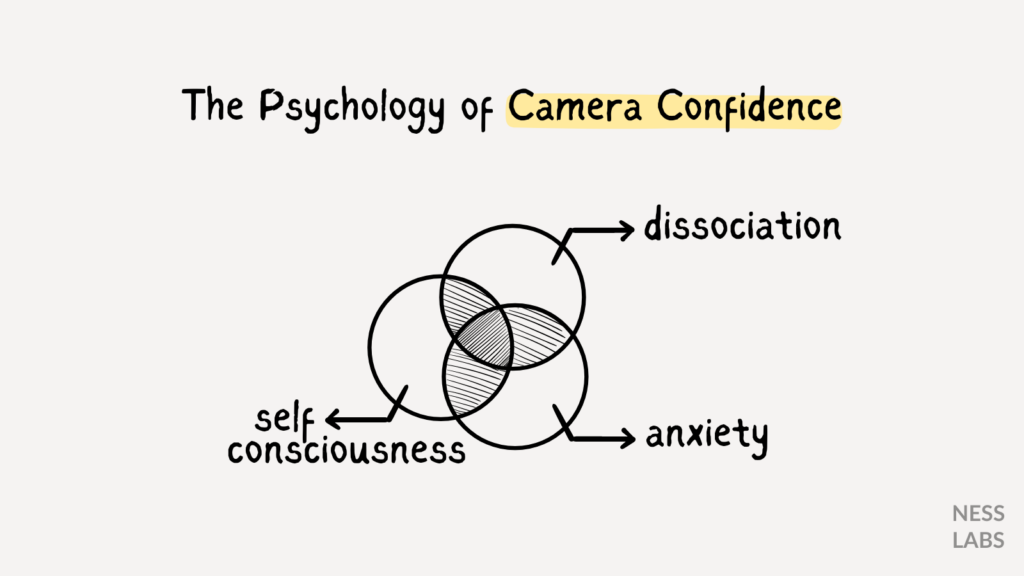Throughout my career, I’ve delivered countless work presentations and student lectures. I’ve given talks in front of hundreds of people. I’ve been a guest on podcasts with millions of listeners.
And yet, when it comes to turning the camera on, filming myself, and posting it online, I’ve been stuck. The mind is capable of incredible creativity when it comes to making up excuses. Bad acne today; I need to do more research; this will take too much time to edit.
In a world dominated by video, we know we’d benefit from communicating effortlessly through video content, whether it’s a quick recording of a workflow to share with colleagues, a story on Instagram to showcase your work, or a self-paced course to scale your coaching practice.
However, many of us struggle to turn that knowledge into action. This is because our fear of talking to a camera is deeply rooted in our survival instincts.
Why we fear talking to the camera
Our instinctive fear of being judged has served for millennia as a way to maintain social cohesiveness. In a very real way, being rejected by the group used to mean death.
When you say something to a friend, to colleagues, or to a crowd, whether it’s online or in-person, your brain automatically analyzes the cues communicated through their facial expressions.
But the camera lens is a cold eye that doesn’t provide any of the human signals we normally use to assess how our behaviors are interpreted. This lack of immediate feedback leads to several instinctive reactions:

Anxiety. Research shows that our brain is designed to try to resolve uncertainty gaps as quickly as possible in order to protect ourselves. When we face a camera, our brain is missing the information it needs to assess how we’re doing and fills in the gap with the worst-case scenarios.
Dissociation. When talking to a camera, we’re separated by time and space from the audience, which makes it hard to connect emotionally with the people who will ultimately receive the message. Talking into a void creates an uncomfortable sense of dissociation (something that happens when everyone has their camera off on Zoom as well).
Self-consciousness. Being in front of a camera often makes us hyper-aware of ourselves, including our appearance and mannerisms. This heightened self-consciousness can lead to overthinking as we become fixated on minor imperfections we wouldn’t notice in the flow of a live conversation or presentation.
Fortunately, there are ways to improve your camera confidence and reduce some of those crippling effects.
How to develop camera confidence
Because it is such a new psychological challenge, there isn’t a lot of research around developing camera confidence. But here are three pillars that can help become more confident when talking to a camera:
1. Psychological safety. If you have lots of anxiety around talking to a camera, you need to ensure the audience you will first practice with is kind and supportive. You don’t need to start by recording yourself and posting videos for the world to see on YouTube. Maybe the audience that makes you feel psychologically safe is your colleagues; maybe it’s your family; maybe it’s just one friend.
2. Practice, practice, practice. Once you have chosen your audience, design a personal experiment to start a practice of recording yourself on video and sharing it with others.
It could be one work productivity tip a day to share with your team, one reflection on your creative process a day to share on your private Instagram account, or one WhatsApp video message a day to share in your family group.
Choose a duration for the experiment that’s aligned with your level of fear. It could be as short as five days if you’re terrified to talk to a camera, or as long as 30 days if you feel more comfortable. I personally started with just 10 days, Marie Poulin went for 100 videos in 100 days!
3. Purposeful reflection. As always, make space for metacognition. What works? What doesn’t? How does it feel? Do you notice that certain formats or that filming in certain locations feel more comfortable? Is there a particular video length that feels natural? Treat this as a little exercise in self-anthropology.
You can even share what you learn through this process with others, in addition to the videos themselves. This form of learning in public can build your confidence as it makes your personal growth useful to others.
Unlocking the benefits of camera confidence
Whether it’s our work or in your personal life, there are many benefits to developing camera confidence.
The first one is increased creativity. When you’re not held back by camera shyness, you’re free to experiment with different presentation techniques and creative styles. This openness to experimentation can not only lead to unique content that sets you apart, it can be a lot more fun as well.
You will also become a more effective storyteller. Being comfortable on camera enables you to convey emotions, emphasize key points, and express your thoughts on a more authentic level, unencumbered by layers of anxiety.
Mostly, this can be an opportunity for personal growth and self-discovery. Building camera confidence involves stepping out of your comfort zone and away from fixed notions of your identity, which can lead to a new understanding of your strengths, interests, and values.
Camera confidence is more than just speaking without fear; it’s about unlocking a world of potential that extends far beyond the lens. Harnessing this skill requires confronting your anxieties so you can discover your voice. I’m very early on this journey, and I’m looking forward to learning with you.
